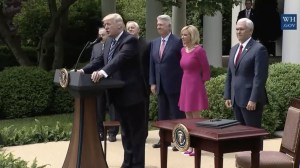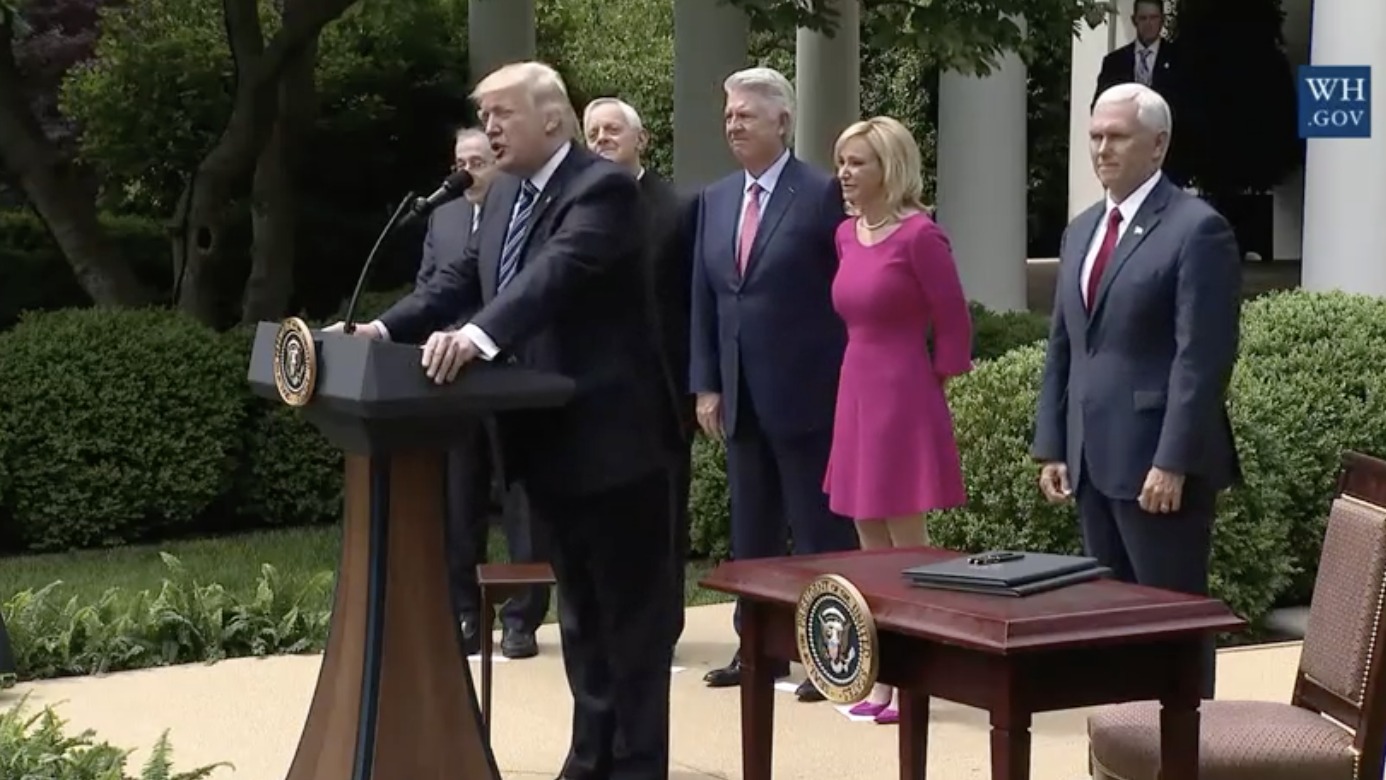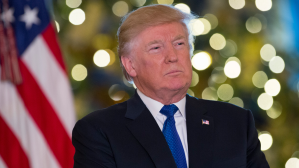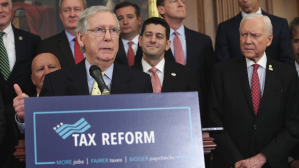In this series

In his biggest religious liberty push since taking office, President Donald Trump officially laid out in an executive order some of the protections he has promised faithful supporters for months. The move came on the same day that evangelical leaders gathered in Washington for the annual National Day of Prayer.
One problem: This is not the executive order many evangelicals had been praying for.
Gone are the exemptions for religious groups faced with accommodating LGBT antidiscrimination regulations that conflict with their faith convictions. Instead, the order entitled “Promoting Free Speech and Religious Liberty” professes to extend political speech protections for pastors and religious organizations, aiming to let them talk about politics without penalty. It also requests “regulatory relief” for religious groups, including evangelical universities, caught in a court battle over the Affordable Care Act’s contraception mandate.
“I am signing today an executive order to defend the freedom of religion and speech in America, the freedoms that we wanted, the freedoms that you fought for so long,” the president said in a Rose Garden ceremony. “The federal government will never ever penalize any person for their protected religious beliefs.”
Trump spoke most about the implications for the Johnson Amendment—legislation that has regulated nonprofits’ political activity for six decades. “This financial threat against the faith community is over,” he said. “You’re now in a position to say what you want to say. … No one should be censoring sermons or targeting pastors.”
While the White House’s broad vision to “protect and vigorously promote religious liberty” holds promise for people of faith, it lacks some of the specific conscience safeguards that many conservative Christians wanted to see.
“Religious conservatives will take comfort from the generally positive attitude toward their religious liberty claims. But in its operative effects, this nowhere goes out on a limb for them,” said Thomas Berg, a professor at the University of St. Thomas School of Law in Minneapolis. “The issues concerning LGBT/religious-liberty conflicts remain, and this gives little indication Trump will go out on a limb on those.”
Trump’s promise to repeal the Johnson Amendment excited some of his closest evangelical allies like Liberty University president Jerry Falwell Jr. and Family Research Council president Tony Perkins. Yet, according to surveys, the majority of evangelicals do not see this issue as a priority, or even on their agenda. Most have major concerns about bringing more politics into their churches.
Earlier this year, the National Association of Evangelicals (NAE) reported in its monthly Evangelical Leaders Survey that 90 percent of its board of directors, including the leaders of major denominations and ministries, oppose using the pulpit for political endorsements. Other surveys show that nearly 3 in 4 evangelicals are also against it.
“When it comes to challenges to religious liberty, the Johnson Amendment is just about the least important issue I can think of,” said John Inazu, a professor at Washington University School of Law.
“More important than whether pastors can speak politics is whether everyone can live their convictions in [the] public square,” tweeted John Stonestreet, president of the Colson Center for Christian Worldview.
An earlier draft of a religious liberty order, leaked in January, focused on balancing religious convictions with LGBT protections. By directing the attorney general to ensure that all federal agencies comply with religious liberty protections, the new order represents a promising move for evangelicals, said Johnnie Moore, an evangelical adviser and consultant.
“This is the single most important religious liberty action taken by the White House in a very long time,” said Moore, who spent hours with Trump and his fellow faith advisers the night the order was drafted. Under the order, “conservative people of faith will feel very, very free that they won’t have to set their conscience aside and be fearful of the law.”
For Trump supporters waiting for the Johnson Amendment to be repealed, it’s a well-timed victory. His executive order coincides with a congressional committee meeting on the amendment as well as his participation in the National Day of Prayer.
A strong majority of white evangelicals are pleased with Trump’s performance as president so far, and dozens of evangelical leaders, including advisers Robert Jeffress and Paula White, gathered at the White House for a dinner with Trump and vice president Mike Pence Wednesday night. The ceremony at the White House featured a welcome by White; prayer by Jack Graham, Cardinal Donald Wuerl, and Rabbi Marvin Hier; and music by singer Steven Curtis Chapman. (Both Pence and White quoted 2 Chronicles 7:14, which was the most-tweeted verse of Trump’s election.)
Trump pledged to “totally destroy” the Johnson Amendment when he spoke at another annual prayer gathering, the National Prayer Breakfast, in February. And during the campaign, he framed the move as a significant part of his religious liberty agenda, saying:
… My greatest contribution to Christianity—and other religions—is to allow you, when you talk religious liberty, to go and speak openly, and if you like somebody or want somebody to represent you, you should have the right to do it.
But today’s victory may be mostly symbolic.
Legal experts question the impact of Trump’s order, which falls short of the promised repeal. It doesn’t specifically allow for pastor endorsements, as the president implied. The order requests that the Treasury Department not deny any “tax deduction, exemption, credit, or benefit” to groups and leaders for speaking about “moral or political issues from a religious perspective.”
The IRS rarely investigates such regulations in the first place—even blatant ones like the hundreds of pastors who preach politics on Pulpit Freedom Sunday, organized annually by the Alliance Defending Freedom (ADF), a religious liberty advocacy group.
“It says only that [religous organizations] should not be found guilty of implied endorsements on facts where secular organizations would not be,” said church-state expert Douglas Laycock. “I have heard no stories of that happening. But the IRS does jawbone churches in a way that it does not appear to jawbone secular non-profits. Maybe that’s what it’s supposed to be about.”
Besides churchgoers’ hesitancy over pulpit politicking, several prominent evangelical leaders, including the general superintendent of the Assemblies of God and the president of the Christian and Missionary Alliance, told the NAE they worry that speaking about candidates during a sermon or service would distract from their primary message of preaching the gospel.
“Many pastors know their parishioners have diverse political opinions and fear being pressured to choose and endorse some while alienating others,” NAE president Leith Anderson said in February. “They are grateful for rules that keep them out of political endorsement differences and battles.”
One alternative solution is the Free Speech Fairness Act. A congressional bill introduced in February, it proposes reforming the Johnson Amendment to allow pastors to maintain their free speech and political speech rights in their day-to-day roles, but restricts additional spending on political messaging—the kind that could turn churches into tax-free shelters for political fundraising.
A significant congressional advisory group, the Commission on Accountability and Policy for Religious Organizations (led by the Evangelical Council for Financial Accountability), recommended such changes in a 2013 report. Laycock made a similar case in the Christian Century earlier this year.
“Wholly repealing the Johnson Amendment would protect both the sermons (part of a church’s ordinary operations budgets) and the full-page ads (which require significant spending). It would create pressure on churches to let themselves be used for tax-deductible campaign spending,” wrote the University of Virginia law professor. “A far better solution: repeal the Johnson Amendment with respect to things that cost no money, and leave it in place for the things that do.”
ADF calls the bill a “first step” toward fixing the amendment: “We remain hopeful that the Free Speech Fairness Act will become law and America’s pastors will once again be free to speak from the pulpit on all matters of life without fearing government censorship or punishment.”
Even the ADF was disappointed in Trump’s order, saying in a statement, “The current outline of the Religious Liberty Executive Order released by White House officials recalls those campaign promises but leaves them unfulfilled.”
LifeWay Research reported in September that just 29 percent of Americans with evangelical beliefs thought it was appropriate for pastors to endorse political candidates. Still, few evangelicals (33%) indicated that churches should lose their nonprofit status over a violation of the rule, which isn’t that common. (Last year, 1 in 10 regular churchgoers said they heard their pastor discuss the candidates, according to a Pew Research Center survey.) Protestant clergy had even stronger opinions: Only 14 percent of evangelical pastors and 9 percent of mainline pastors approved of pulpit endorsements.
At the ceremony, Trump nodded to Martin Luther King Jr.’s niece, activist Alveda King, as he celebrated the African American church “as an agent of social progress” in its willingness to address politics from the pulpit. The legacy plays out in Pew data, with black Protestants three times more likely to hear candidates mentioned during a church service.
The order asks the Treasury, Labor, and Health and Human Services departments to “consider issuing amended regulations, consistent with applicable law, to address conscience-based objections” to Obamacare. Just last week, the Justice Department prolonged the appeals court fight over the contraception requirement.
“The President’s order makes clear that all federal agencies and lawyers must obey the law and respect religious liberty," said Mark Rienzi, senior counsel at Becket, the firm that represents the Little Sisters and others challenging the HHS Mandate. “As the Supreme Court’s orders show, it was unnecessary and illegal to impose this mandate on the Little Sisters and other religious organizations. Our country has enough real problems without picking pointless culture wars against women who spend their lives caring for the elderly poor. America is better than that.”
A statement from the NAE concluded, “Anything done by executive order can be undone by a future president. Threats to religious freedom in America need to be addressed through legislative action that protects religious liberty for all Americans. We call on President Trump to work with members of Congress to pass legislation that strengthens the rights of all Americans and allows the organizations they form to operate in ways that are consistent with their beliefs.”













